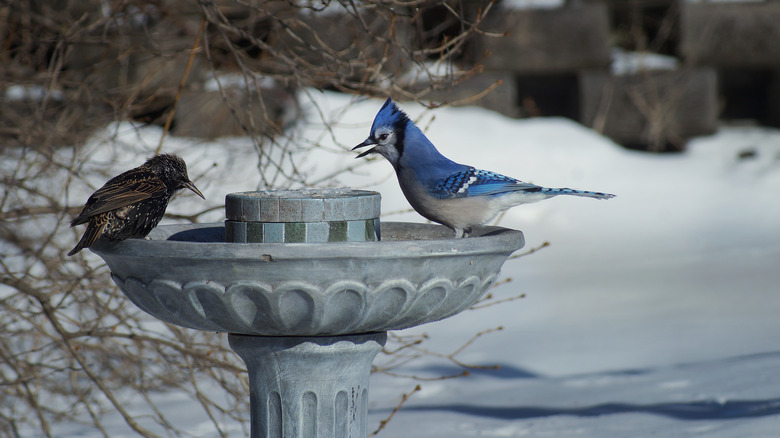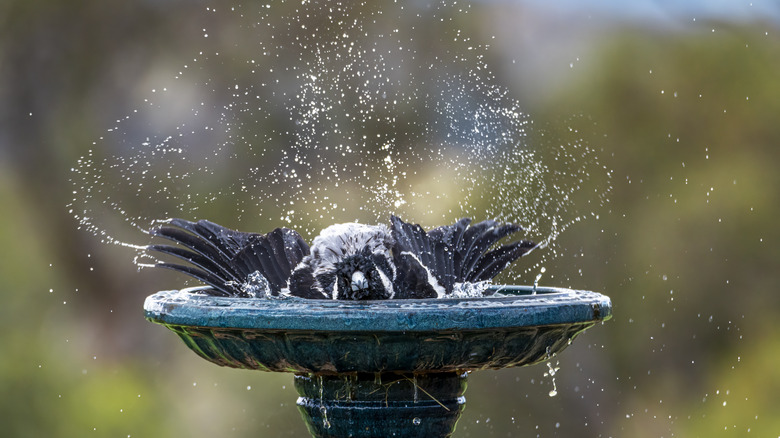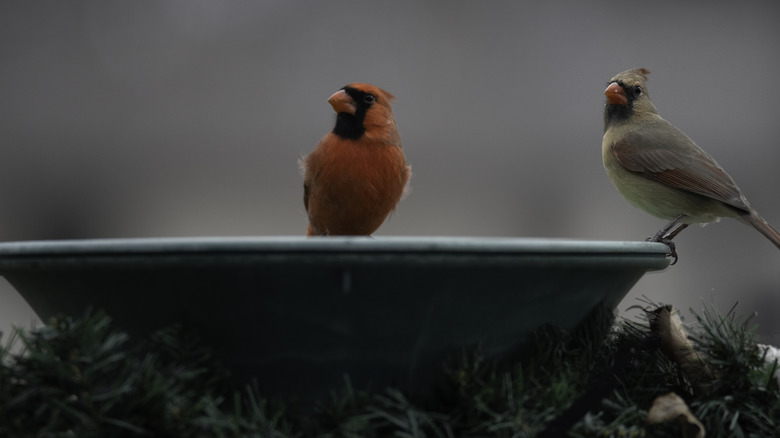Using This Ingredient To Keep Your Birdbath From Freezing Is A Big Mistake
We may receive a commission on purchases made from links.
To keep your feathered friends happy throughout the winter season, it's a kind gesture to keep a fresh, usable bird bath in your yard. Birds that don't venture to warmer climates in the winter need access to water for drinking and bathing, even in cold weather. Water is essential for their hydration and maintaining their feathers. By providing a non-frozen water source, homeowners can help birds survive during the winter months when natural water sources may be scarce or frozen. Additionally, a bird bath can attract a variety of bird species, creating opportunities for birdwatching. There are a variety of ways to keep your birdbath from freezing in cold snaps — but one method you should avoid is adding salt to the water.
Some might be tempted to use salt during the winter because it's readily available and inexpensive. It is commonly used to melt ice and prevent freezing, so it may seem like a logical choice for a birdbath as well. However, it is important to understand the potential harm that salt can cause to birds and the environment. While the initial temptation may be to use salt, it is crucial to consider alternative methods that are safe and sustainable for the well-being of birds and the preservation of the ecosystem in your yard.
Why salt is harmful to birds
Salt is harmful to birds if it is used in birdbaths because it can be toxic if ingested. Birds have a delicate balance of salts in their bodies, and consuming excessive amounts of salt can disrupt this balance and lead to serious health issues. The high sodium content in salt can cause dehydration, kidney damage, and even death in birds. Additionally, salt can also have a negative impact on the digestive system of birds. The excessive intake of salt can lead to an increase in thirst, causing birds to drink more water than usual. This can result in an imbalance in their digestive system, leading to gastrointestinal problems.
Using salt in birdbaths can also have detrimental effects on the environment. Unintentionally, the salt can contaminate the surrounding soil and water sources. As birds splash and bathe, the salt can seep into the ground and accumulate in the soil. This can have negative effects on plants and other organisms that rely on the soil for nutrients and water. Additionally, the salt can also leach into nearby water sources, such as ponds or streams. High levels of salt in water can be toxic to fish and other aquatic organisms, leading to their decline or even extinction. Therefore, using salt in birdbaths not only poses a risk to birds but also has far-reaching consequences for the environment.
Keeping your birdbath from freezing
To keep your birdbath from freezing, it's important to explore safer alternatives than using salt. One better method is to use a floating de-icer — a device specifically designed to keep bird baths from freezing. It consists of a heating element that is placed in the water, preventing it from freezing over. The de-icer is thermostatically controlled, meaning it only turns on when necessary to maintain a safe temperature. This method is safe for birds as they can still access the water without being exposed to harmful substances.
Another alternative is a solar-powered bird bath heater, like this one from Amazon. This device consists of a solar panel and a heating element and uses solar energy to generate heat and keep the water from freezing. It's safe for birds as it doesn't involve any chemicals or toxins. It is also environmentally friendly as it relies on renewable energy and does not contribute to greenhouse gas emissions. Finally, another simple solution is to position the birdbath in full sun so that it will naturally melt throughout the day, giving birds access to water. You can aid this process by boiling water, letting it cool, and topping up the bath with warm water regularly to encourage melting while also cleaning the birdbath.


